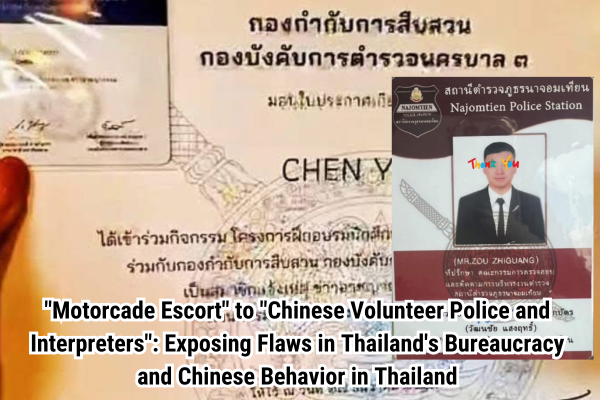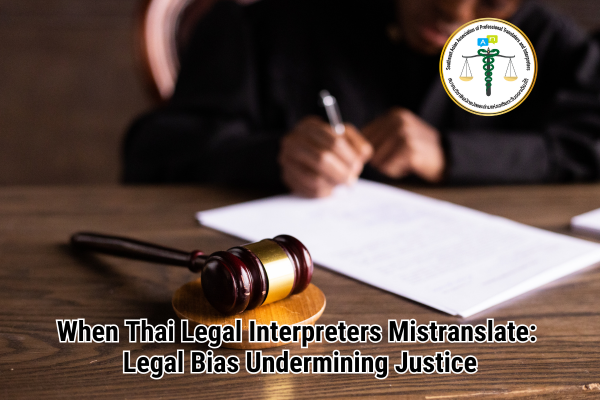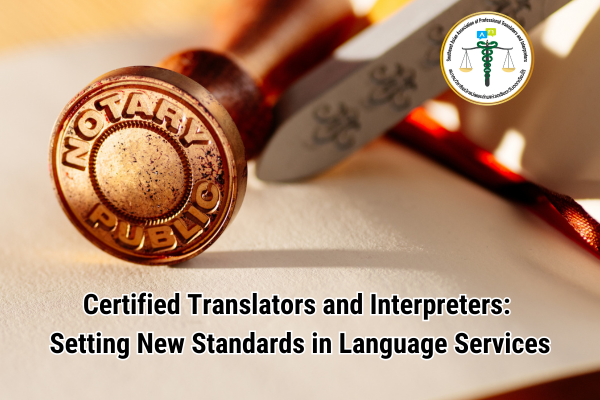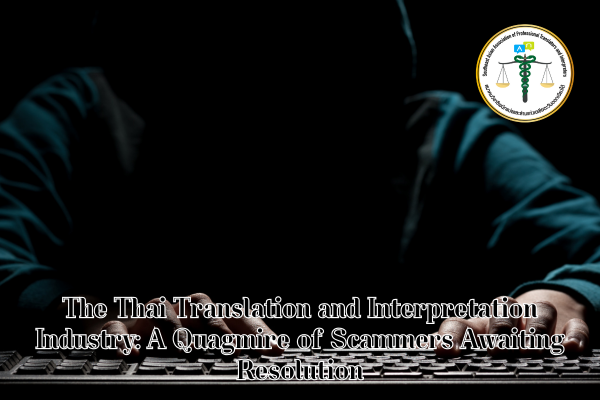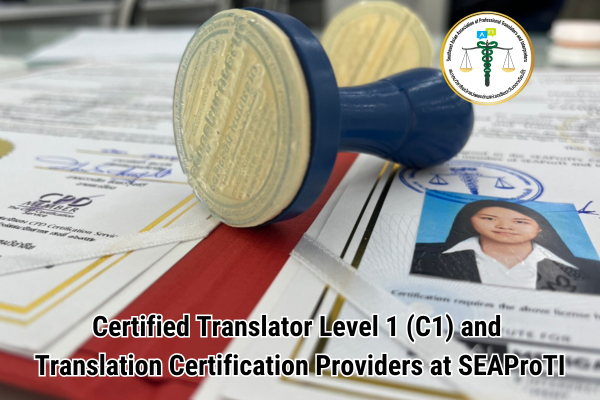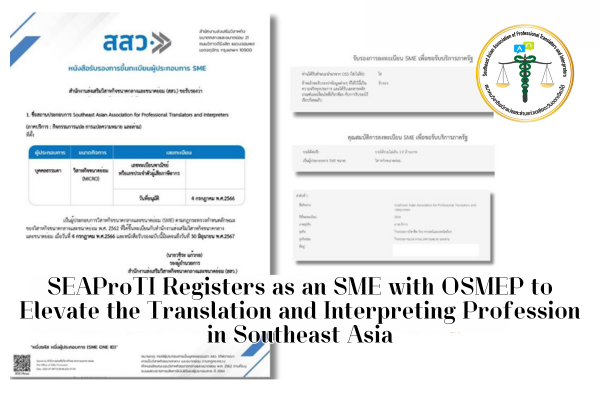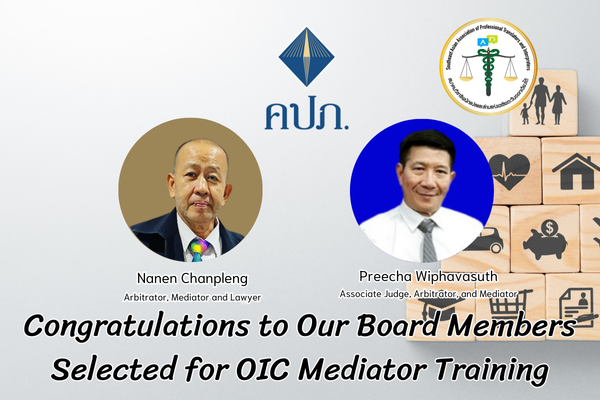From “Motorcade Escort” to “Chinese Volunteer Police and Interpreters”: Exposing Flaws in Thailand’s Bureaucracy and Chinese Behavior in Thailand
4 January 2025, Bangkok – At the beginning of 2025, Thailand is facing intense scrutiny over issues involving certain Chinese groups exploiting the nation’s bureaucracy for personal gain. These issues not only reveal misconduct in the use of authority but also highlight systemic flaws in Thailand’s governance, including weak law enforcement and a lack of transparency. Cases such as the motorcade escort services and the training of Chinese volunteer police, alongside the proliferation of unauthorized interpreters, shed light on these challenges, calling for urgent reforms.
From Motorcade Escorts to Chinese Volunteer Police
One of the first incidents to capture public attention occurred in 2023 when Chinese individuals promoted the hiring of Thai police for motorcade escort services from Suvarnabhumi Airport. This practice was revealed in a viral video on social media, where the service fee was reportedly 7,000 THB. This event sparked public outrage, as it was seen as an inappropriate use of state resources for private gain. Although the involved officers were penalized, the incident underscored how certain Chinese groups manipulated official authority for personal convenience.
In 2025, another controversy emerged when a lawyer exposed a training program for Chinese volunteer police. The program charged participants 38,000 THB and provided police vests and volunteer ID cards upon completion. The program’s legality and use of official insignias without authorization were questioned. This prompted the Royal Thai Police to launch an investigation and pledge to penalize those involved.
Chinese Behavior in the Context of Asian Culture
According to Associate Professor Pol. Lt. Col. Dr. Kritsanaphong Phutrakul, a criminology expert at Rangsit University, certain Chinese individuals in Thailand exhibit a tendency to seek status and power, a characteristic commonly observed in Asian cultures. Uniforms or symbols of authority, such as police motorcade escorts, serve as markers of privilege and social standing.
For some Chinese nationals, acquiring privilege in Thailand not only symbolizes social status but also reflects their expectation that bureaucratic systems can be influenced through financial transactions or personal connections. However, for Thai citizens, this behavior often evokes a sense of injustice, as taxpayers are required to adhere strictly to rules and procedures.
Unregulated Interpreters: A Hidden Issue
Beyond motorcade escorts and volunteer police, the issue of unauthorized interpreters, particularly among Chinese nationals, has also come to light. This problem undermines the standards of professional interpretation services in Thailand and creates unfair competition in the labor market. Unauthorized interpreters often bypass formal qualifications and operate within a system that lacks stringent oversight.
The unchecked presence of these interpreters not only affects service quality but can also lead to serious business and legal consequences due to communication errors or mistranslations. This issue highlights the urgent need for improved regulatory frameworks and licensing for foreign workers in Thailand.
Flaws in Thailand’s Bureaucratic System and Their Consequences
These incidents reveal underlying weaknesses in Thailand’s bureaucratic system, influenced by various factors such as inadequate law enforcement, ethical breaches among officials, and a lack of proactive oversight. These systemic issues erode public trust in state institutions and tarnish Thailand’s international reputation.
Furthermore, a culture of deference within the bureaucracy often prevents strict punishment for misconduct. This perpetuates a cycle where improper behavior is emulated and normalized, creating broader negative implications for governance. Addressing these flaws requires a transparent and accountable bureaucracy capable of resisting exploitation.
Repercussions for Thai Society
The exploitation of bureaucratic authority by certain Chinese groups has sparked dissatisfaction among Thai citizens. Many feel that while they adhere to strict regulations, others can bypass these processes through financial means, further undermining trust in public institutions.
Additionally, Thailand’s image as a fair and transparent society is at stake. Allowing these issues to persist damages the country’s reputation on the global stage, particularly in terms of its governance and justice systems.
Pathways to Sustainable Solutions
Addressing these challenges requires comprehensive reforms targeting the structural weaknesses within Thailand’s bureaucracy. Enforcement of laws against misconduct must be rigorous, with clear penalties for those who exploit the system. Transparency and accountability should be prioritized at every level of governance.
Proactive oversight is equally critical. Agencies like the Royal Thai Police and the Inspector General’s Department must adopt proactive measures, such as monitoring online activities and engaging with community concerns, to prevent issues before they escalate.
Moreover, professionals who demonstrate integrity, including police officers and interpreters, should be supported and rewarded to encourage ethical practices. Establishing clear career advancement opportunities for ethical behavior will serve as a strong incentive and a model for others to follow.
Conclusion
The cases of “Motorcade Escorts” and “Chinese Volunteer Police and Interpreters” are more than isolated incidents of misconduct; they are symptomatic of deeper structural problems within Thailand’s bureaucracy. These issues call for urgent systemic reform to restore public trust and safeguard the nation’s reputation.
Comprehensive measures, such as strict law enforcement, transparent governance, and proactive oversight, are crucial to addressing these problems. By fostering justice and accountability, Thailand can build a robust bureaucratic system that promotes fairness and strengthens its standing on the global stage. Sustainable development depends on the country’s ability to address these challenges and ensure equitable governance for all.
About SEAProTI’s certified translators, translation certification providers, and certified interpreters:
The Southeast Asian Association of Professional Translators and Interpreters (SEAProTI) has officially announced the criteria and qualifications for individuals to register as “Certified Translators,” “Translation Certification Providers,” and “Certified Interpreters” under the association’s regulations. These guidelines are detailed in Sections 9 and 10 of the Royal Thai Government Gazette, issued by the Secretariat of the Cabinet under the Office of the Prime Minister of the Kingdom of Thailand, dated July 25, 2024, Volume 141, Part 66 Ng, Page 100.
To read the full publication, visit: the Royal Thai Government Gazette
“รถนำขบวน” สู่ “อาสาตำรวจและล่ามจีน” สะท้อนช่องโหว่ระบบราชการไทยและพฤติกรรมชาวจีนในไทย
4 มกราคม 2567, กรุงเทพมหานคร – ประเทศไทยในปี 2568 กำลังเผชิญกับกระแสวิพากษ์วิจารณ์ที่รุนแรงเกี่ยวกับการแสวงหาผลประโยชน์จากระบบราชการของชาวจีนบางกลุ่ม ปัญหานี้ไม่เพียงแต่เกี่ยวโยงกับพฤติกรรมการใช้อำนาจในทางที่ผิด แต่ยังสะท้อนช่องโหว่ในระบบราชการไทยที่ยังขาดความโปร่งใสและการบังคับใช้กฎหมายอย่างเข้มงวด กรณีการจ้างรถนำขบวนและโครงการอบรมอาสาตำรวจ รวมถึงปัญหาการประกอบอาชีพล่ามเถื่อนของชาวจีนในไทย ชี้ให้เห็นถึงความท้าทายเชิงโครงสร้างที่ต้องเร่งแก้ไข
การแสวงหาอภิสิทธิ์ชนในไทย: จากรถนำขบวนถึงอาสาตำรวจจีน
เหตุการณ์แรกที่จุดประเด็นความสนใจ คือกรณีชาวจีนเชิญชวนให้จ้างตำรวจไทยเป็นรถนำขบวนจากสนามบินสุวรรณภูมิในปี 2566 โดยมีการเผยแพร่คลิปวิดีโอในโซเชียลมีเดีย ซึ่งชี้ให้เห็นว่ามีการเรียกเก็บเงินค่าบริการ 7,000 บาท เหตุการณ์นี้สร้างความไม่พอใจในหมู่ประชาชนไทย เนื่องจากเป็นการใช้ทรัพยากรของรัฐในทางที่ไม่เหมาะสม แม้ตำรวจที่เกี่ยวข้องจะถูกลงโทษแล้ว แต่กรณีนี้กลับสะท้อนถึงความเชื่อมโยงระหว่างการแสวงหาผลประโยชน์จากอำนาจของเจ้าหน้าที่รัฐและพฤติกรรมการจ่ายเงินเพื่อรับบริการพิเศษ
ต่อมาในปี 2568 กรณี “ทนายแจม” เปิดเผยโครงการอบรมอาสาตำรวจจีนที่เก็บค่าฝึกอบรมหัวละ 38,000 บาท และมอบเสื้อกั๊กตำรวจพร้อมบัตรอาสาตำรวจให้ผู้เข้าร่วม ยิ่งเพิ่มความร้อนแรงให้กับประเด็นนี้อีก โครงการดังกล่าวถูกตั้งคำถามอย่างหนักเกี่ยวกับความถูกต้องทางกฎหมาย และการใช้เครื่องหมายราชการโดยไม่ได้รับอนุญาต สำนักงานตำรวจแห่งชาติต้องออกมาชี้แจงและดำเนินการสอบสวน เพื่อหาผู้ที่เกี่ยวข้องและลงโทษตามระเบียบ
พฤติกรรมชาวจีนในบริบทของวัฒนธรรมเอเชีย
จากการวิเคราะห์ของรองศาสตราจารย์ พ.ต.ท. ดร.กฤษณพงค์ พูตระกูล นักวิชาการด้านอาชญาวิทยา พบว่าชาวจีนบางกลุ่มที่เข้ามาในไทยมีพฤติกรรมยึดติดกับอำนาจและสถานะทางราชการ ซึ่งเป็นลักษณะทั่วไปในวัฒนธรรมเอเชีย การสวมเครื่องแบบหรือมีรถนำขบวนที่เกี่ยวข้องกับเจ้าหน้าที่รัฐ ช่วยเพิ่มภาพลักษณ์ของความมีอภิสิทธิ์ชนและสร้างความสะดวกสบายในชีวิตประจำวัน
สำหรับชาวจีน การได้รับอภิสิทธิ์ชนในไทยไม่เพียงแต่แสดงถึงสถานะในสังคม แต่ยังสะท้อนความคาดหวังต่อระบบราชการที่อาจตอบสนองต่อความต้องการของพวกเขาผ่านการจ่ายเงินหรือการใช้ประโยชน์จากความสัมพันธ์ส่วนตัว อย่างไรก็ตาม ในสายตาคนไทย พฤติกรรมเช่นนี้กลับสร้างความรู้สึกถึงความไม่ยุติธรรม เนื่องจากคนไทยที่เป็นผู้เสียภาษีมักต้องปฏิบัติตามกฎระเบียบโดยเคร่งครัด
ล่ามเถื่อน: ปัญหาที่ซ่อนอยู่ในสายตาสังคม
นอกเหนือจากกรณีรถนำขบวนและอาสาตำรวจจีน ยังมีประเด็นการปล่อยให้ชาวต่างด้าว โดยเฉพาะชาวจีน เข้ามาประกอบอาชีพล่ามเถื่อนในไทย ปัญหานี้ส่งผลกระทบต่อมาตรฐานวิชาชีพล่ามในประเทศ และสร้างการแข่งขันที่ไม่เป็นธรรมในตลาดแรงงาน ล่ามเถื่อนเหล่านี้บางครั้งไม่ได้ผ่านการอบรมหรือรับรองตามกฎหมาย แต่สามารถเข้าถึงโอกาสทางอาชีพได้โดยอาศัยช่องโหว่ในระบบการตรวจสอบ
การปล่อยให้ล่ามเถื่อนทำงานในไทยไม่เพียงแต่ส่งผลเสียต่อคุณภาพของบริการ แต่ยังอาจก่อให้เกิดความเสียหายในเชิงธุรกิจและกฎหมาย เนื่องจากการสื่อสารที่ผิดพลาดหรือการแปลที่ไม่ถูกต้อง ปัญหานี้ย้ำถึงความจำเป็นในการปรับปรุงระบบตรวจสอบและการออกใบอนุญาตสำหรับแรงงานต่างด้าว
ช่องโหว่ในระบบราชการไทยและผลกระทบที่ตามมา
ปัญหาที่เกิดขึ้นสะท้อนถึงความอ่อนแอในระบบราชการไทย ซึ่งเกี่ยวข้องกับปัจจัยหลายประการ ทั้งการขาดความเข้มงวดในการบังคับใช้กฎหมาย การละเมิดจรรยาบรรณของเจ้าหน้าที่ และการขาดการตรวจสอบเชิงรุก ปัญหาเหล่านี้ไม่เพียงแต่บั่นทอนความเชื่อมั่นของประชาชนต่อหน่วยงานรัฐ แต่ยังส่งผลกระทบต่อภาพลักษณ์ของประเทศไทยในสายตาชาวต่างชาติ
นอกจากนี้ การเกรงใจผู้บังคับบัญชาในระบบราชการยังเป็นปัจจัยที่ทำให้การลงโทษเจ้าหน้าที่ที่กระทำผิดไม่มีความชัดเจน ส่งผลให้เกิดการเลียนแบบพฤติกรรมที่ไม่เหมาะสมในวงกว้าง ระบบราชการไทยจำเป็นต้องปรับปรุงให้มีความโปร่งใสและป้องกันการใช้อำนาจในทางที่ผิด
แนวทางแก้ไขเพื่ออนาคตที่ยั่งยืน
การแก้ไขปัญหาเหล่านี้จำเป็นต้องเริ่มจากการปฏิรูประบบราชการไทยในเชิงโครงสร้าง ซึ่งควรรวมถึงการบังคับใช้กฎหมายที่เข้มงวดต่อผู้กระทำผิด และการส่งเสริมความโปร่งใสในทุกระดับของการปฏิบัติงาน หน่วยงานที่เกี่ยวข้อง เช่น สำนักงานตำรวจแห่งชาติและจเรตำรวจ ควรเปลี่ยนแนวทางการทำงานเป็นการตรวจสอบเชิงรุก เพื่อป้องกันปัญหาที่อาจเกิดขึ้นในอนาคต
นอกจากนี้ ควรส่งเสริมให้ตำรวจและล่ามที่มีความซื่อสัตย์ได้รับการสนับสนุนและพัฒนาความก้าวหน้าในสายอาชีพ การสร้างระบบรางวัลที่ชัดเจนสำหรับผู้ที่ปฏิบัติงานอย่างดี จะช่วยสร้างแรงจูงใจให้เจ้าหน้าที่รัฐรักษามาตรฐานของตนเอง
บทสรุป
กรณี “รถนำขบวน” และ “อาสาตำรวจและล่ามจีน” เป็นภาพสะท้อนของปัญหาที่ลึกซึ้งในระบบราชการไทย ซึ่งต้องการการปฏิรูปเชิงระบบอย่างเร่งด่วน การแก้ไขปัญหาเหล่านี้ไม่เพียงแต่ช่วยฟื้นฟูความเชื่อมั่นของประชาชนต่อองค์กรรัฐ แต่ยังส่งเสริมภาพลักษณ์ของประเทศไทยในเวทีนานาชาติ การสร้างความยุติธรรมและความโปร่งใสในระบบราชการจะเป็นรากฐานสำคัญในการพัฒนาประเทศให้ยั่งยืนในอนาคต
เกี่ยวกับนักแปลรับรอง ผู้รับรองการแปล และล่ามรับรองของสมาคมวิชาชีพนักแปลและล่ามแห่งเอเชียตะวันออกเฉียงใต้
สมาคมวิชาชีพนักแปลและล่ามแห่งเอเชียตะวันออกเฉียงใต้ (SEAProTI) ได้ประกาศหลักเกณฑ์และคุณสมบัติผู้ที่ขึ้นทะเบียนเป็น “นักแปลรับรอง (Certified Translators) และผู้รับรองการแปล (Translation Certification Providers) และล่ามรับรอง (Certified Interpreters)” ของสมาคม หมวดที่ 9 และหมวดที่ 10 ในราชกิจจานุเบกษา ของสำนักเลขาธิการคณะรัฐมนตรี ในสำนักนายกรัฐมนตรี แห่งราชอาณาจักรไทย ลงวันที่ 25 ก.ค. 2567 เล่มที่ 141 ตอนที่ 66 ง หน้า 100 อ่านฉบับเต็มได้ที่: นักแปลรับรอง ผู้รับรองการแปล และล่ามรับรอง


